Trepidation

Alfred Stieglitz: Self-Portrait with camera, tripod, and pistol (1886)
"It feels like the thousand deaths …"
This week promises to become one of those weeks that were. So many weeks come and go without leaving many footprints. I recently failed to recall entire quarters where I'd dedicated myself to writing series now lost to memory, if not necessarily to history. I reassured myself that nobody remembers all the books Twain wrote, and he remains perhaps the most popular writer in our history. This week, my copyeditor promised to deliver her completed work on my pending manuscript. I am not warmly anticipating reading her results. Though I firmly believe in the copyeditor's beneficial contribution, I would have preferred to forego this specific stage of manuscript development. I'd asked her last December if she could provide a quick check to prove that my manuscript required her effort. She asked me to send her a few pages. She almost immediately responded that she found five glaring errors in the first paragraph!
Humbled into acceptance then, I told her I'd get back to her after some deeper consideration.
DaysOff

Russell Lee: Seaside, Oregon, is vacation spot (1941)
United States. Farm Security Administration
"My work, my play."
I don't take vacations. DaysOff seem out of the question. My summertime's filled with obligations that effectively prevent me from leaving home. Who would water the gardens and tend the cats? More than that, who would write the daily missive if I went missing? I understand that my time isn't refundable. If I miss a day, I've forfeited it, never to be recovered. I will never again stand in that place or time. I feel a sacred obligation to keep my nose near to this grindstone. When I have to go away, I take my business with me. I can rise just as early elsewhere as I can rise here, so my production continues even if I'm jury-rigging connections in a tiny hotel room in Paris. I will consent to visit, but I will not agree to suspend my writing for even a day.
I do not write for a living; I live to write.
CounterIntuitive

Jack Gould: Untitled [women lined up in front of counter,
seen from behind shop counter] (c. 1950)
"We're destined to become mere observers of our computations."
A great myth was created at the dawn of the personal computing age. Before then, when computing exclusively resided within large organizations, computer professionals took considerable pride in their ability to work within tenaciously hostile intellectual environments. They were, after all, professionals, so their methods and practices should have, by all rights, remained obscure and mysterious to the general public. These professionals reveled in their status as eggheads and were seen as much more intelligent than the Average "Regular" Person. Many became conversant in what was properly referred to as "machine language" and could think and dream in ways never imagined by Average "Regular" Persons.
The dilemma arose when technology advanced to the point where personal computers became feasible.
Weekly Writing Summary For The Week Ending 06/26/2025
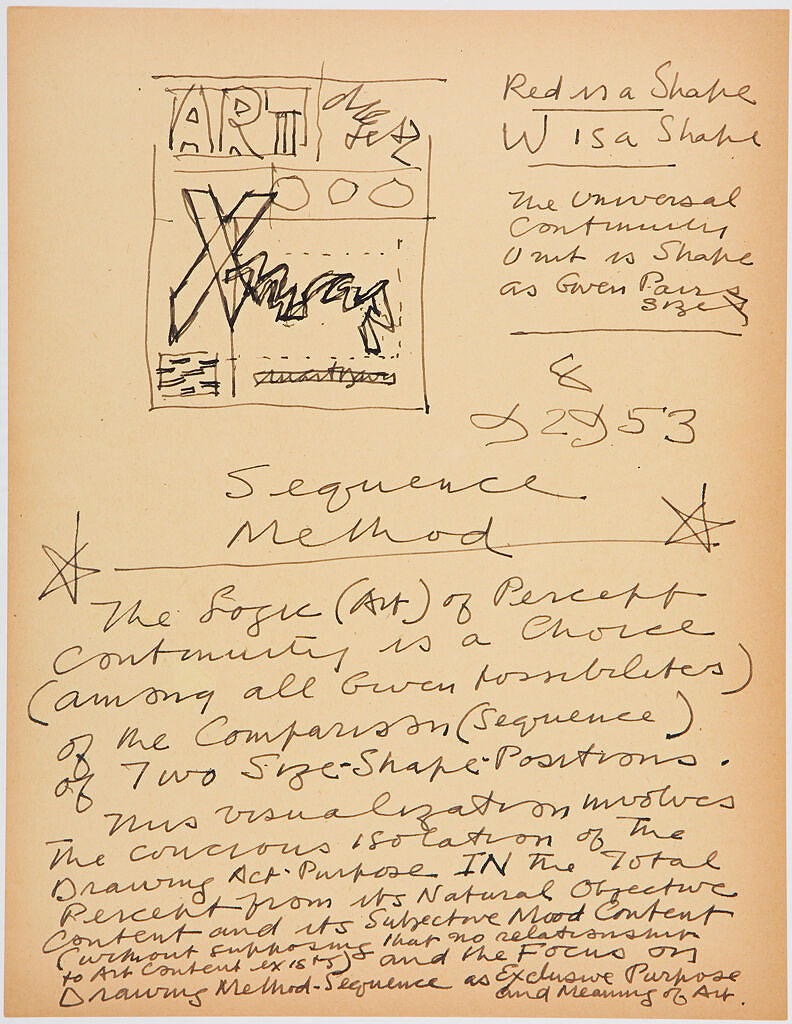
Stuart Davis: Study for “’Art Digest’ Cover” (1953)
Just Like This Administration
Physicists maintain a unique sort of humor within their ranks. They award an Ignoble Prize to scientists performing particularly absurd studies. They're attracted to Irreproducible Results. They amuse themselves analyzing Cartoon Physics, the sort to which Wylie Coyote runs sideways. Does Coyote Gravity exist? It turns out that, while the realization that nothing supports you doesn't actually trigger gravity into action, a discernible delay comes into play when someone inadvertently attempts to walk on air when blindly running off the end of a mesa. Objects do not flatten to the extent shown in cartoons when running full speed into an immovable object, though some flattening does occur.
Our incumbent engaged in Cartoon Physics last week when explaining what happened when some Bunker Buster® bombs hit an Iranian uranium enrichment facility buried deep underground.
TechTalk

Kate Greenaway: The disappointment. (1890)
"I will be back at it again tomorrow morning."
Technology promised what every innovation has always promised: ease. It has yet to deliver. Not that this failure has chased off many customers. I know of nobody who made good on their pledge to rid themself of their frustrating technology. No, we return with fresh hopes the following morning, only to rediscover the depth of technology's betrayal. It does not seem to care. It seems incapable of giving a damn. We stopped being mere users decades ago, before our technology became this convoluted. Tangle built upon previous tangles to produce a mess whose designers probably don't understand.
My technology holds the power to transform me into a whimpering eight-year-old at virtually any time.
Broken

J. B. B. Wellington:
The Broken Saucer (c. 1880/90, printed April 1890)
" … not even duct tape holds anything together forever."
I have attained an age where much of what surrounds me seems Broken. I suspect that this acknowledgement accompanies aging, since in my more innocent youth, I seemed surrounded by more operational than Broken stuff. My stove-top espresso maker's handle was missing this morning. It had broken off a few weeks ago when the house cleaner accidentally knocked it off the countertop. I'd fixed it with some superglue, and that held until a few days ago, when it let go. I learned that I'd have to find some high-temperature glue to more permanently fix it, so I placed that need into my ever-burgeoning pending queue. I'll get around to finding that when I finally get around to finding that, assuming I ever remember to. In the meantime, I discovered that two pot holders held just so suffice as a fix until something more permanent manifests.
Much of my existence seems to be suspended in just that state: Pending Something More Permanent.
Preference
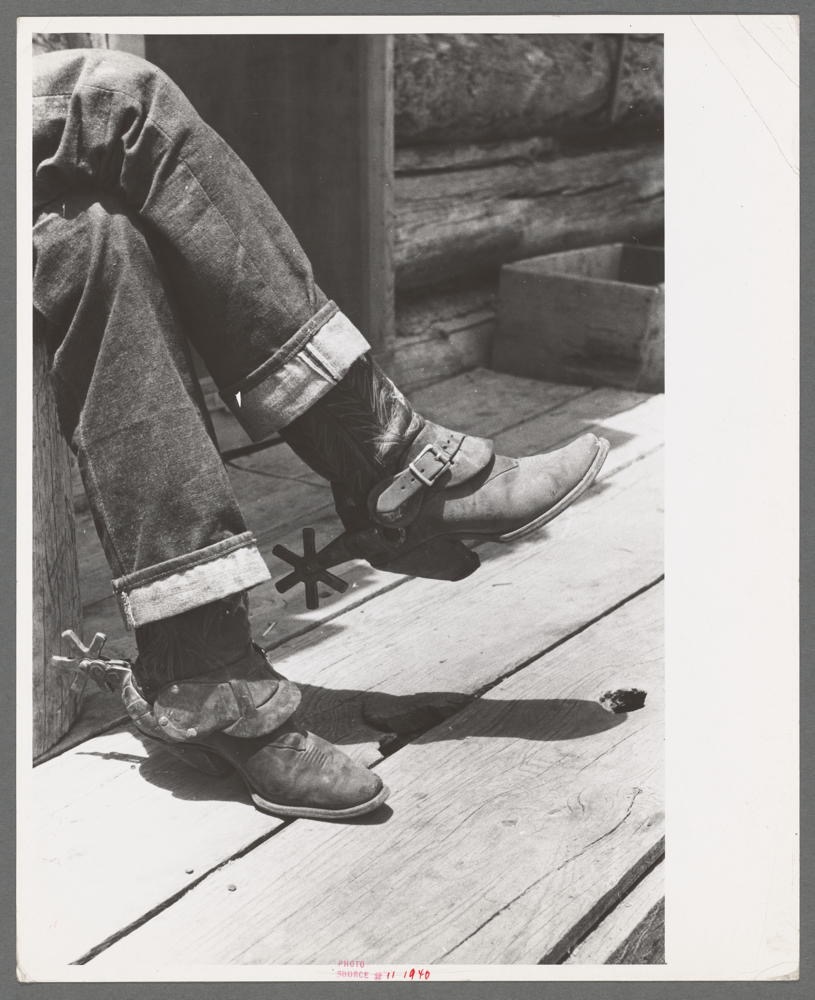
Russell Lee: Detail of farmer's blue jeans, boots and spurs.
This man was once a cowboy and still prefers the cowboy's dress,
Pie Town, New Mexico (1940) Farm Security Administration
"I expect that I'll always struggle to get in touch with my heart's desire …"
I struggle when responding to anyone asking about my preferences. I was raised to be more sensitive to what others prefer than to my own preferreds, a valuable skill in a family with five kids where neediness easily translated into a form of weakness. I learned early the value indifference brought and the cost neediness wrought. I was rarely considered to be a picky eater. Quite the opposite, I was known for my adventurous palate. My dad "preferred" chicken backs so his kids could feast on the meatier cuts. My mom could turn into a genuine Christian martyr sometimes, denying her personal preference in deference to her kids'.
Making matters worse, when I was in Junior High School, I found an old Victorian text in the local Goodwill book section, “The Kingship of Self-Control.” I took that book to heart.
DroppingIn

Harold Edgerton: Milk Drop Coronet (c. 1936)
" … not nearly as alone in this world as we could have sworn we were sometimes."
Most of us live well-regulated lives. This renders us more predictable than we might be otherwise. There is no question about whether we imprinted on hunter-gatherer or farmer behavior. We're definitely farmers. We rise at just about the same time each morning. Through the day, we follow a schedule that defines our edges. We reliably show up for supper at the usual time. We even regulate our vacations, planning routes, stops, and experiences. We try to leave little to chance.
Hunter-gatherers, though, left much to chance.
Priorities

Ben Shahn:
Untitled [Washington Court House, Ohio] (July-August 1938)
"The evil done in our name serves as the greatest evil of all."
Our incumbent waddled off his golf course to fly back to his supposed home to deliver another borderline incoherent rant about something. He sounded triumphant as he spewed his usual paradoxes, pleading for a peaceful end to a violent engagement he initiated. So much for the great negotiator, now reduced to pre-emptive triumphalism.
The Muse and I had spent our day harvesting.
FollowingMyself
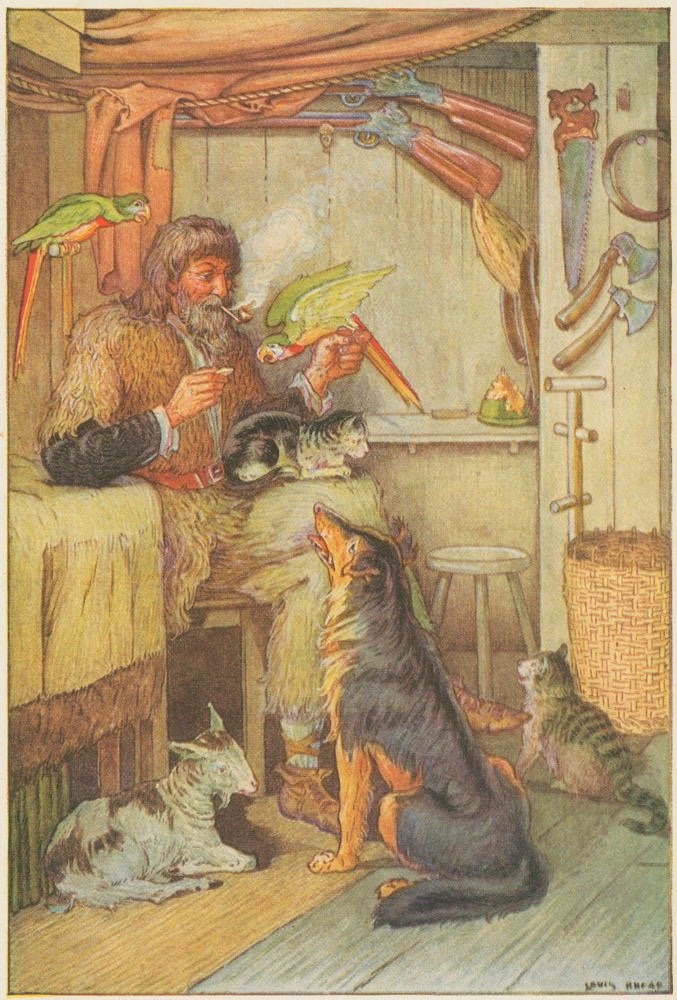
Louis Rhead: I diverted myself with talking to my parrot (1900)
— Illustration from 1900 William Taylor edition of The Life and Strange Surprizing Adventures of Robinson Crusoe, of York, Mariner: Who lived Eight and Twenty Years, all alone in an un-inhabited Island on the Coast of America, near the Mouth of the Great River of Oroonoque; Having been cast on Shore by Shipwreck, wherein all the Men perished but himself. With An Account how he was at last as strangely deliver'd by Pyrates. Written by Himself. (Popularly known as Robinson Crusoe.)
" … accepting that I'm finally in charge of FollowingMyself."
Beyond a certain uncertain point, I find I have to lead myself. The trailblazers and popularizers I once looked to for direction have either left the building or proven themselves incapable of further advising me, so divergent have our paths and aspirations become. What early in my careers became an identity struggle has laid down its weapons. My identity is finally no longer a mystery to me. Neither are my fallacies. I more deeply understand my underlying absurdities as well as my fundamental decencies. I remain incomplete yet almost complacent, satisfied having life come at me, finally understanding and accepting that I never really had any alternative. I have arrived.
Where I've arrived might not matter.
Weekly Writing Summary For The Week Ending 06/19/2025
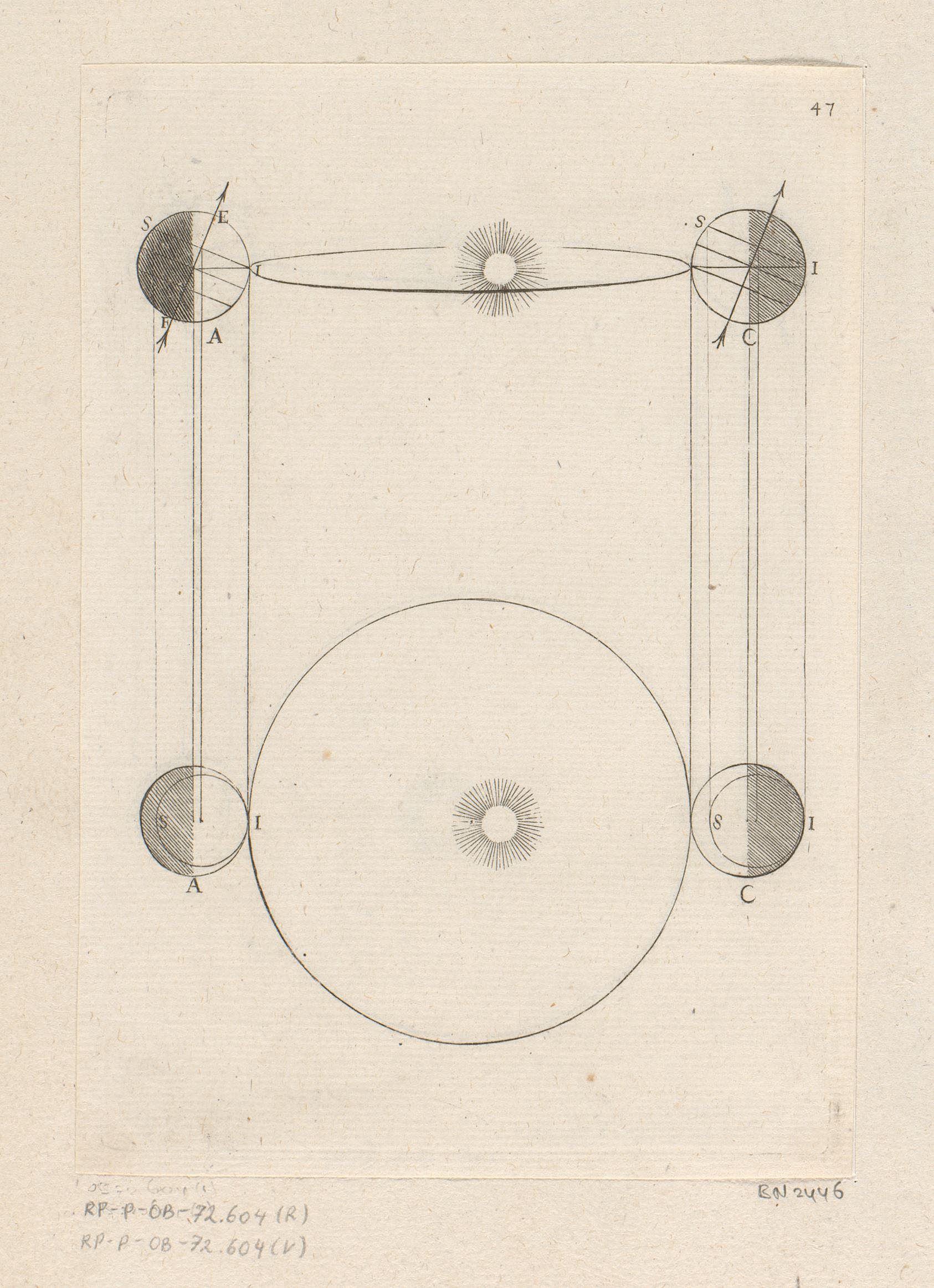
Sébastien Leclerc:
Gelijkheid van dagen en nachten tijdens zonnewende
[Equality of days and nights during solstice] (1706)
Might Be One Day
I suppose I'm not supposed to understand why anyone might choose not to dedicate themselves to encouraging domestic tranquility. This world remains no less beautiful than its potential ever promised, yet some seem to flee from every opportunity to take it easy, to make it easier. I've been writing about our incumbent, a person who never didn't have a couple of screws loose, as if he might one day catch on and start trying to catch up, but I acknowledge he's incapable; supremely incapable, as I might also be.
The tragedy remains that it could still be as it could and should be, but we reject those possibilities, and I suppose we reject the opportunities we receive as poorly-timed or otherwise not quite right.
FollowingChapters

Sebald Beham: Prodigal Son Keeping his Swine (1538)
" … wherever they might lead."
By my count, I will be finishing my thirty-second series this week. I began writing these during a period of professional despair, when I wondered if I was or ever had been a writer. I figured that if I was a writer, I could damned well write, so I set about writing an essay every morning. By the end of the first quarter, I'd produced a book-length work. I continued the exercise, perhaps only a tad bit more convinced that I might be a writer after all. Now, the end of eight years later, I find myself finishing my thirty-second such series. Honestly, I cannot quickly even list the names of all of them in sequence. As usual, software problems, by which I probably mean 'user difficulties,' have resulted in a small black hole in 2022, so that I've temporarily lost access to a few quarters' stories. Nothing I can't recover with considerable frustrating effort.
As I've neared each ending, I've started questioning what I should be doing next.
TheAmericanDisease
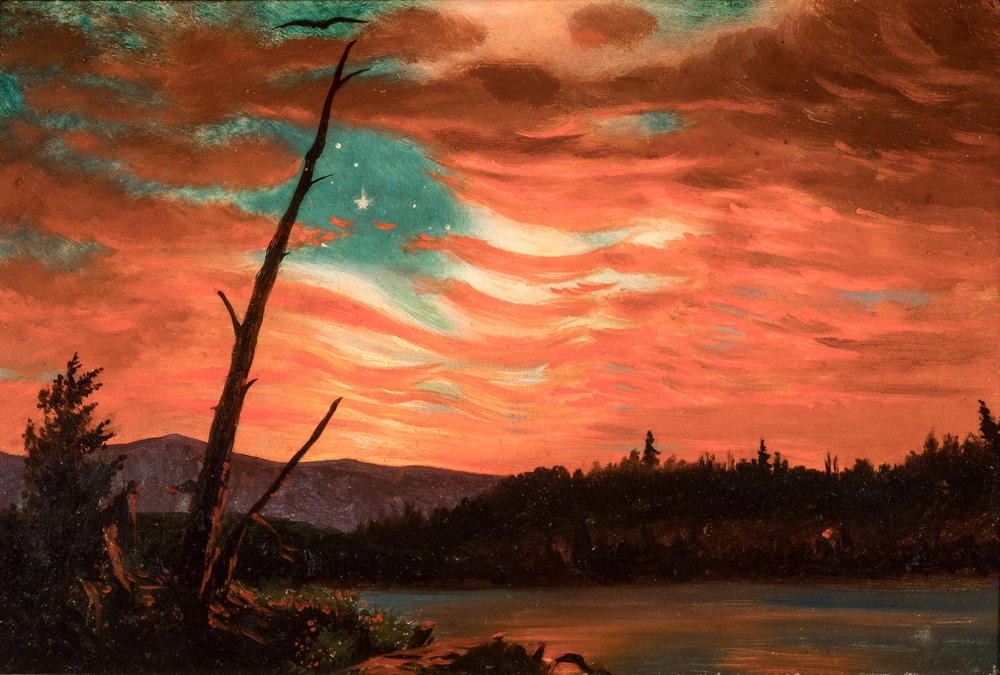
Frederic Edwin Church: Our Banner in the Sky (1861)
Gallery Text:
Within this vibrant scene of atmospheric flux, an opening within a roiling cloud layer reveals stars against a blue firmament. The barren tree in the foreground doubles as a pole for this celestial apparition of the “broad stripes and bright stars” of the U.S. flag. Following the rapid succession of political provocations that led to Confederate forces firing on Fort Sumter, Church channeled his belief in the divine righteousness of the Union cause into this patriotic visual spectacle.
As the sectarian conflict stretched from weeks into months, the oil sketch, with its allegorical river valley resembling the Catskills and the Hudson River, was translated into a popular chromolithograph. The prints were issued by the New York branch of Goupil & Cie as a subscription fundraiser to support the families of Union soldiers. This is one of the few lithographs from the series that Church painted by hand.
— —
"We live with our thumbs on the scale."
Something ails us. Something has always ailed us, back to our earliest aspirations. We firmly believed ourselves to be blessed beyond all others. We were seldom humbled in acknowledgement. We took possession and became possessed. Perhaps it was the blessing that possessed us to behave not as if we deserved the blessing but as if we were owed it.
Our original sin was greater than many others.
LostOn
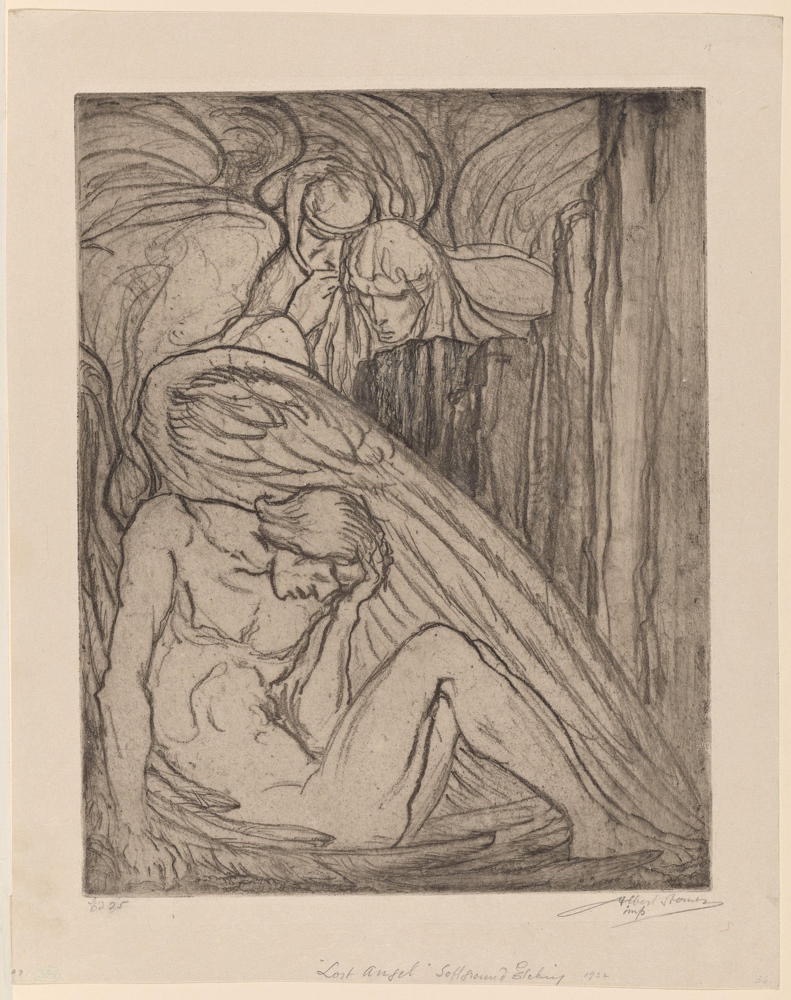
Albert Sterner: Lost Angel (1932)
" … to keep myself company while I watched my potency and influence evaporate."
Almost in retrospect now, I perceive that much of the material I produced in this series would have been LostOn our incumbent, who seems especially resistant to much beyond relatively mindless memes. Of course, it's always been the case that those anyone feels really need specific information, prove incapable of absorbing its meaning. This difficulty has troubled geniuses as well as idiots, and might well serve as the ultimate dilemma. It might be that anything undertaken expressly for another's good proves incapable of delivering that result. Sarcasm holds an especially special place in this particular pantheon, for it, above all other literary forms, proves least likely for the one needing its message to receive it. A boss once confided to me that there is no place in business for sarcasm. It might be that there's really no place in this world that's safe for it, either.
But then, sarcasm might be a gift only its author can ever receive.
Slander&Libel
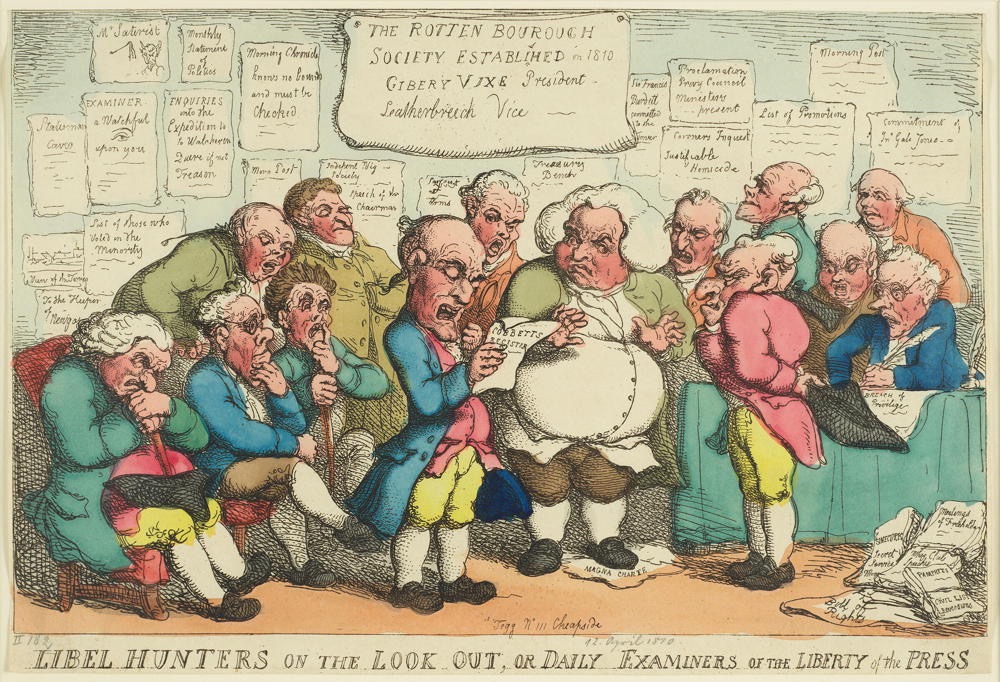
Thomas Rowlandson: Libel Hunters on the Look Out,
or Daily Examiners of the Liberty of the Press
Series/Book Title: Tegg's Caricatures
Published by Thomas Tegg (April 12, 1810)
"I've been Coping by averting my gaze and Hoping for better …"
With what have I been so actively Hoping for and Coping with through this series? Aside from the frequently malign attempts at misadministration, the mischaracterization of virtually everything has been haunting me most. During his first term, we had almost grown accustomed to the ever-growing lists of untruths produced by him and his team. It seemed that nothing ever crossing those lips came close to any truth, let alone the whole or anything but. It seemed more like the perennially partial and everything but the truth from that machine. They seemed inherently disagreeable. No sky could be characterized as blue but what one of his supporters would get their nose all out of joint to argue about the actual color, which was essentially always clearly some shade of blue. The pickier the complaint, the more weight it seemed to carry. The effort seemed primarily focused on discrediting anyone of decent character. We stopped wondering how low they might go because they always went even lower than that in their attempts to … what? Bolster their boss's delicate ego?
It becomes curiously frustrating when I know for sure that someone is lying to me. It's not that I cannot see right through each fresh fiction.
Fizzled

Henri Matisse: Woman before an Aquarium (1921–23)
Gallery Notes: In the first two decades of the 20th century, Henri Matisse visited exhibitions of Islamic art and traveled to Algeria and Morocco, where he collected pottery, textiles, and tiles. Years later, while living in Nice, France, Matisse reflected on these experiences, integrating visual elements he encountered, such as the patterned textile screen, into his paintings. In Woman before an Aquarium, the carefully subdued decorative pattern of the screen contributes to the psychologically rich, contemplative mood of this interior scene.
"Happy birthday to us, they cheered, ignoring the irrelevant incumbent."
For all of the existential dread that fueled so much of this series, little damage has resulted. Yes, calamities ensued, but very little was likely to last even to the impeachment, for he uniformly chose poorly both in terms of objectives and executors. The incompetence seemed simultaneously stunning and unsurprising, for even those not closely watching his first so-called administration understood that he had never been anybody's administrator. Gifted solely in self-promotion, none of his many promises ever came to pass.
He spawned more legal actions than anything else, and he succeeded with very few defenses except to delay what everyone always understood would not be victories.
CHoping
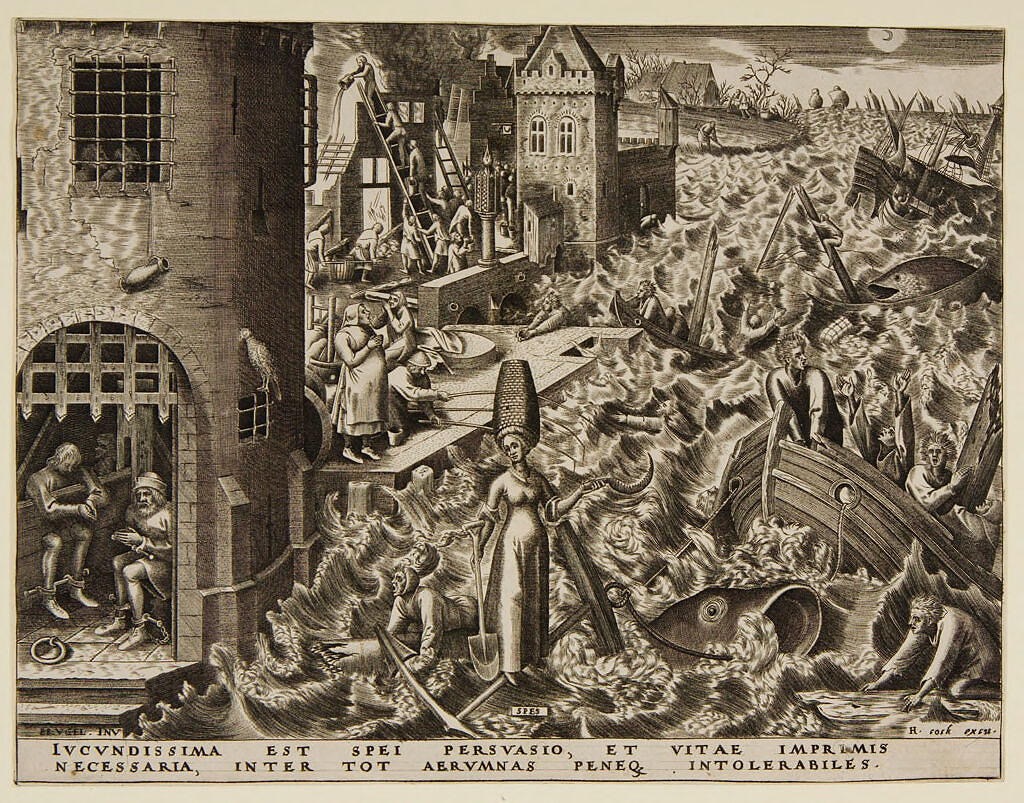
Pieter Bruegel, the Elder: Hope (c. 1559)
" … an obscure, long-neglected corner of the garden."
Difficult times seem to demand some definitive response, but I often feel stymied in those contexts. If I felt more empowered, I might respond more immediately, but difficult times seem especially designed to take away my authority to act. They seem to leave me with few options beyond humiliating acquiescence. I stumbled upon two unlikely superpowers, though, that, when combined, seemed to give back much of my authority to act, however unlikely these separately seem capable of reversing humiliation: Hoping and Coping. I combined these into another one of my words that annoy the spell checker: CHope. I might have better employed the gerund form, though, because these require activity to make any difference. I have been actively practicing CHoping rather than merely embodying CHope over these past nearly three months.
It doesn't matter whether I start by hoping or by coping, though starting with hoping seems the more logical departure point.
Weekly Writing Summary For The Week Ending 06/12/2025
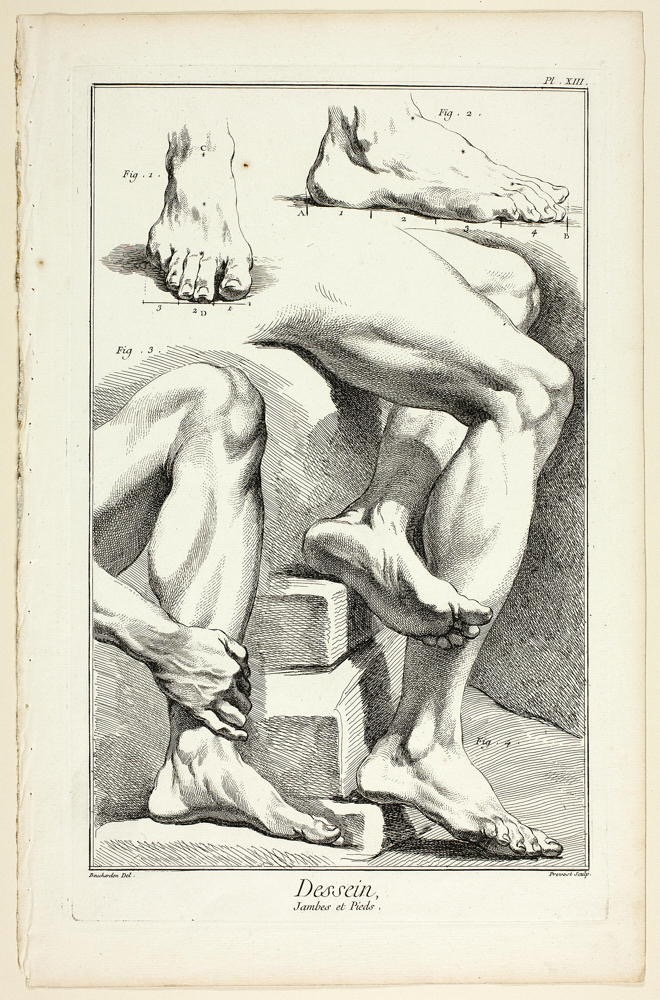
Benoît-Louis Prévost:
Design: Legs and Feet, from Encyclopédie (1762/77)
Summer Seems Uninfluencable, Inexorable
July arrived in early June this year, bringing with it all the usual seasonal concerns. I have to relearn my coping strategies every year, for I never seem to retain their details. I lose a rhythm I must regain, like the understanding that outside work must be completed by noon or I suffer consequences. The basement stays at the same wine-cellar temperature year-round. The windows open at bedtime, before closing us in again before ten the following morning. The sounds of ceiling fans remain a constant companion. If I forget to close the window shade in front of my desk, the late afternoon sun will bake my desktop. The watering schedule seems sacred. The backyard pond finally appears to be clearing. The goldfish perform an appreciative ballet when I feed them in the late afternoon, as shadows overtake our backyard refuge. The first fires began blackening our parched landscape, and everyone seems on edge, welcoming while also dreading our most dangerous season. I can huddle through Winter and reason with Spring, but Summer seems uninfluencible, inexorable.
Un-American
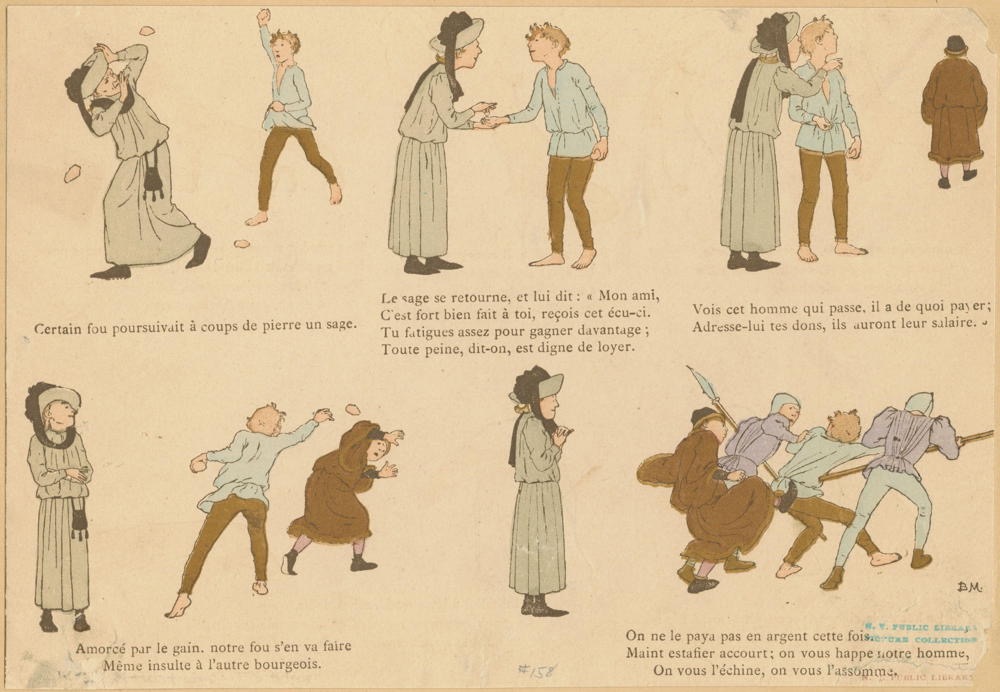
Boutet de Monvel: Un fou et un sage [A fool and a wise man] (1888)
"He might be the most significant land mass to hold office since Grover Cleveland left office."
I have a confession to make. I understand that our incumbent has been talking about arresting those who would criticize him and his [Administration]. (I was forced to place the word [Administration] within braces because the best evidence demonstrates that he and his cronies have yet to successfully administer anything.) I understand that, according to him and his minions, it should be a crime to take their lord's name in vain. I hereby publicly admit that I have committed this heinous act on more than one occasion, and often with evident satisfaction. Further, I've overtly encouraged others to do the same, sometimes even engaging in something akin to "Playing The Dozens", even resorting to gleefully engaging in bouts of The Dirty Dozens. Instead of "Yo Mama So Fat That … " I said, "Yo President So Fat That …". What's the prescribed punishment?
I'm old enough to remember when The American Way included what was then referred to as The Loyal Opposition, where our Justice Department would have never contemplated filing charges against any citizen accused of defaming any elected official, warranted or not.
Slurtenty

Ferdinand-Victor-Eugène Delacroix:
A Turk Surrenders to a Greek Horseman (1856)
Gallery Text
In the mid-1850s, Delacroix returned to themes he had treated thirty years earlier, though with an important difference. Rather than carefully distinguish literary from historical and topical subjects, he conflated them, as in this instance. Here, he draws on Byron’s description of the giaour (a Turkish slur for non-Muslims) overcoming the Turkish pasha in his poem “The Giaour, a Fragment of a Turkish Tale” (1813). To a contemporary audience, the composition could have appeared to be an episode from the Greek War of Independence (1821–32), a romantic cause célèbre that had inspired two of Delacroix’s large canvases of the 1820s. The result is a nostalgic invention that appealed to mid-century French orientalist fantasies.
"We seem the most curious crown of creation imaginable."
People often accuse me of "not getting with the program." I do not feel all that plugged in. Others seem to have access to resources I never imagined existed. One might proclaim that we might never recover from our incumbent's inept non-administration, and I usually feel the need to ask them how they know, for I can't sense a source of information that might lead anyone to conclude anything with such certainty. I usually receive some litany of evidence that doesn't quite add up to proof by my accounting, and typically leave the encounter at that. I, convinced they were talking out of their hat, and they with their confidence bolstered, neither of us any wiser.
People seem to react to uncertainties by becoming overly confident about something nobody can ever be sure about.
Paradoxysm
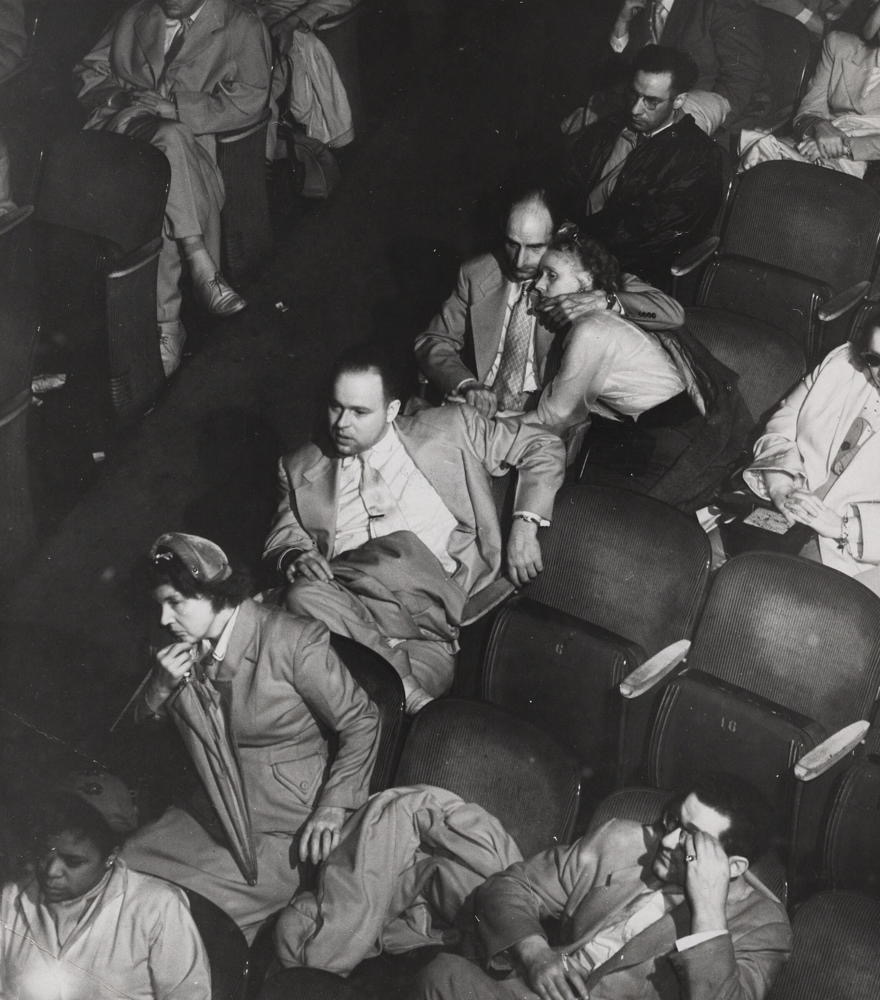
Weegee (Arthur Fellig): Audience Reaction (c. 1940 - c. 1950)
" … get over the idea that they'd never get another decent shave …"
Our incumbent fulfills his responsibilities under our Constitution by not fulfilling his duties under our Constitution, and has steadfastly done so since the first few seconds after solemnly swearing to, you know, fulfill his responsibilities under our Constitution, thereby joining the ever-popular cast of Zeno's favorites, right next to the barber who famously shaved everyone in town who didn't shave themselves. Who shaves that barber, Zeno wondered? He quickly realized that he'd asked a Fundamentally Unanswerable Question, commonly referred to as a FUQ. Those who routinely hand out FUQs by either speech or action tend to gum up the operation of whatever system they find themselves embedded within. The critical judgment ordinarily necessary to avoid introducing errors into systems tends to become muddled when confronting one of Zeno's insidious paradoxes. What might otherwise seem straightforward becomes essentially unresolvable.
After the conventionally unanswerable questions get asked, only to remain annoyingly unanswered, litigation understandably follows.
Opposition

Hendrick ter Brugghen (signed by artist) (1628)
Heraclitus
Gallery Notes: The Greek sage Heraclitus was known as the crying philosopher because he mourned the folly of humankind, while his opposite, Democritus (the nearby pendant), could only laugh at it. Here, Heraclitus looks like a melancholy old man. Downcast, he leans on a terrestrial globe and gestures dismissively with his left hand, as if to say: ‘All is for nought, the world will come to nothing.’

Hendrick ter Brugghen (signed by artist) (1628)
Democritus
The Greek philosophers Democritus and Heraclitus were considered to be polar opposites. In contrast to the old, melancholy Heraclitus (the nearby pendant), Democritus appears as a young, laughing hedonist. He points to the distance, as though that is where the folly of mankind is found. Together, the pair of paintings conveys a moralizing message: whether you laugh or cry, the world remains incurably foolish.
" … when we're not watching closely enough to notice."
I rarely acknowledge how steadfastly I oppose my actions. If a loyal Opposition exists, I embody it. I hesitate when I might charge. I likewise usually fail to notice how effectively everyone around me works to undermine themselves, too. It's as if we each possess a gyroscope spinning somewhere inside that tries to keep balance by introducing opposing forces into our efforts. On my better days, I feel fully capable of acknowledging these forces, and even that they sometimes seem to manage to eventually produce the opposite of whatever it was I claimed to be pursuing. The Ancient Greek Philosopher Heraclitus insisted that things inevitably become their opposite, as if this was as normal an attribute as height or weight. This trait need not necessarily spark concern. I take considerable solace in acknowledging that our incumbent must be prey to precisely this same force of nature.
I suspect he's unaware that he represents his own, most effective opposition.
FalseBelief

Albrecht Dürer: Justice, Truth, and the Future
in the Stocks before the False Judge (1526)
"These performances exhaust everyone involved."
Nobody can successfully argue that democracy isn't inefficient, but then those who argue for efficient government might misunderstand government's deeper purpose. What should justice cost? What overhead does injustice inexorably extract? Should we simply avoid engaging as a society in inherently inefficient activities that do not properly scale, like education and medicine? Should we always expect some return on our investments in governance, or are some sunk expenses, table stakes extracted as the inescapable price of engaging in governing at all?
My forebears here in the Valley They Liked So Well They Named It Twice built a grand county courthouse back near the beginning of the prior century. They raised their own taxes to accomplish this and accepted private donations from grateful immigrants. It still stands there, being remodeled and updated at considerable cost today. When we needed to expand a few of the county offices, a bankrupt bank's building was purchased rather than raise taxes to build another edifice for the ages. Which building better represents a deep respect for the institution, the wedding cake building or the more modern one? Which one might elicit pride as you enter to conduct your business, and which might evoke the sense that you're engaging in a commercial transaction rather than an essential social interaction? There are good reasons why churches traditionally build inspiring edifices for the ages.
And what of the heretics, those who cannot seem to get with the program? For the authoritarian, the heretic presents a special sort of dilemma. A leader can demand fealty but not belief, for demanded belief seems different. One can go through the motions without convincing anyone, especially themself, that they represent a true believer, and authoritarians demand, above and before all else, true belief. Loyalty tests might ensue should any questionable behavior show through, and try as one might, nobody can successfully pantomime the genuflections of any true believer unless, of course, they hold true belief. Demanding true belief presents a paradox to all but the true believer. If belief requires volition, it's provably false. Only those who truly love God get into heaven, or so the doctrine insists. Mimicking rituals doesn't quite cut it.
My son believes that my father's family might have been coerced into catholicism back in the seventeenth century. The pope at that time required everyone to take a surname if they didn't already have one, for the underlying purpose of tax administration. All those Benny the Candlemakers would have to adopt a formal name. Some chose Candlemaker while others chose Gross or Schmaltz, to reflect that their profession essentially entailed collecting unused fat and rendering it into candles. The chosen name would have to be called out in the town square by the tax collector, and those who chose Gross or Schmaltz as their surname would force the collector to call out words that were then embarrassing to proclaim. However, they were more than just early tax protesters. Some were Jews who had been coerced into practicing catholicism. The first Holy Roman Emperor, Charlemagne, a distant grandfather of mine, earned his designation by coercing heathens into the church, often at the point of a sword. It might be true that most catholics were initially forced into their faith, though over subsequent generations, many grew into more willing observance.
FalseBelief has never been uncommon. Every culture frowns upon some behavior or practice, and some within each culture get born sideways to the prevailing ways. The authoritarian always insists that their gays choose to be perverts, but the perversion originates in the rules for exclusion adopted by those in charge. They issue Be Spontaneous Paradoxes, demanding that true believers demonstrate their faith with their behaviors because they want to. Those who violate these edicts either overtly or because they cannot successfully mimic a faith they do not possess, whether through defiance or nature, become the enemy from within, and their presence cannot be countenanced. Furthermore, it has always been the case that any decent authoritarian creates a cadre of those they know for certain can't comply with their demands. These became his handy heretics who can be punished to demonstrate what happens when someone defies his divinely inspired authority.
The continued insistence finally encourages FalseBelief, even and especially among the formerly truer believers. The premise upon which their faith relied could not maintain itself in practice. The authorities cannot hold the FalseBeliever in check any more than the FalseBelievers can continue pretending to want to believe. These performances exhaust everyone involved. As Bonnie Raitt said, “I can't make you love me if you don't. I can't make your heart feel something it won't." © 1991 by Universal Music - Mgb Songs, Almo Music Corp., Brio Blues Music
©2025 by David A. Schmaltz - all rights reserved
Ideological
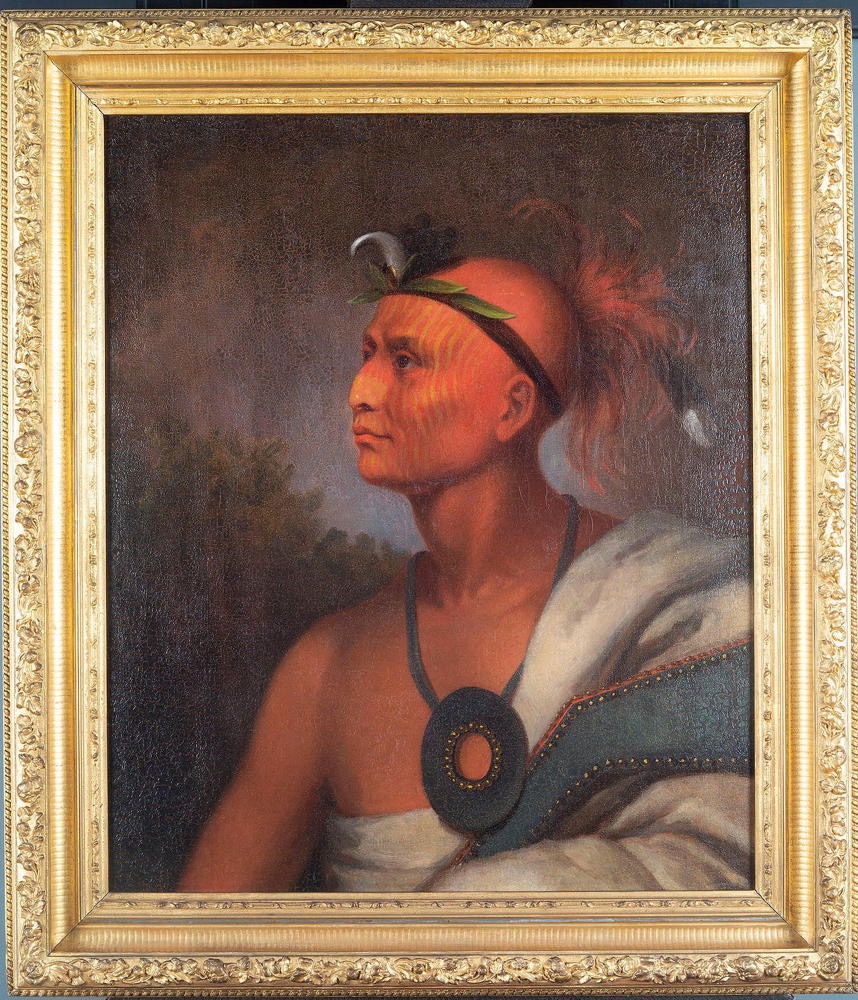
Henry Inman: [Tah-Col-o-Quoit (Rising Cloud)],
Asakiwaki/Sauk Warrior;
representative of the Sauk and Fox coalition
Former Title: [Tah (sha)-col-o-quoit], Sauk and Fox Delegate
(c. 1832-1834)
" … promising greatness as if from the mouth of God."
Perhaps the primary difference between what most of us might recognize as regular order and the MAGA World manifesting before us might be best acknowledged as the fundamental difference between policy-driven and ideology-driven governance. Policy-driven governance relies on agreements negotiated between often opposing viewpoints, as embodied in the 'Out of Many, One' notion, codified as the official motto of this nation. This characterization deftly encapsulates democracy in practice. It's naturally full of contention but also well-practiced as resolution. For every disagreement, some compromise might exist, and the primary purpose of self-governance must be to find these and agree to live within them. Absolutism cannot coexist within democracy's inherent pluralism. There's right, wrong, and left: right or wrong, what matters might always be whatever's left after the passionate argument.
What's left is policy, a statement of agreement intended to transcend right and wrong.
Weekly Writing Summary For The Week Ending 06/05/2025
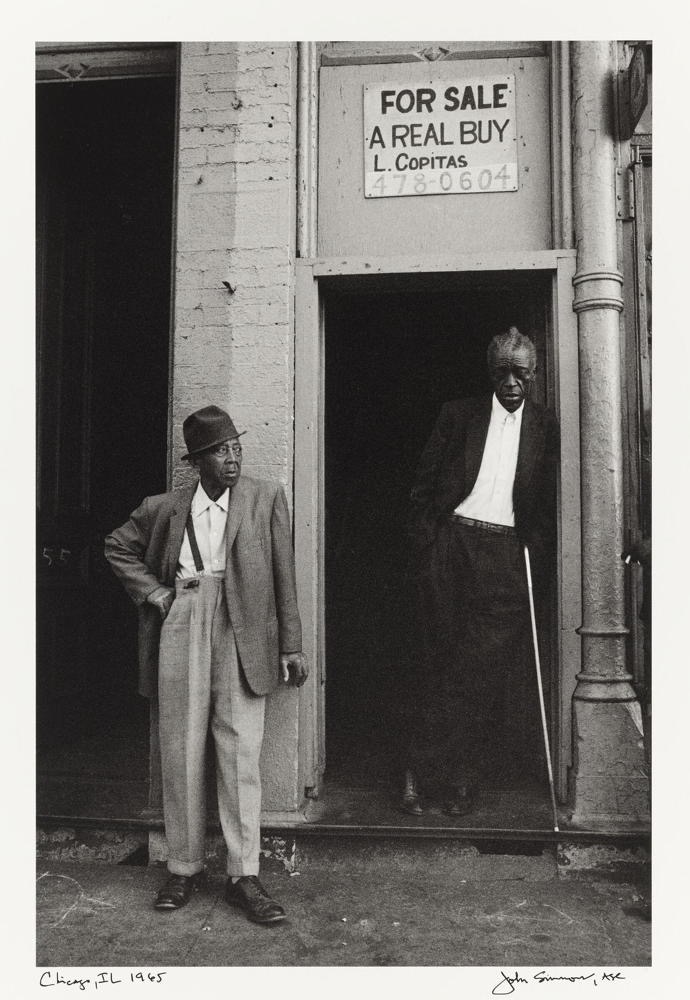
John Simmons: Man With A Pistol, Chicago (1965)
My Aches and Pains
Aging turns out to work differently than I'd imagined. I thought wisdom might visit, but so far, it hasn't. I see my contemporaries generally acting more foolish, which doesn't come as much of a surprise. Disease has ravaged many, and this wasn't unexpected, except I expected some justice to be represented in those it chose. It hasn't. It might be an illusion, but the innocent seem more vulnerable than any reasonable supreme being would have deigned. The cost of aging gets exacted in aches and pains, which ultimately seem inescapable. The meaning of those gets transposed into indicators of well-being. In our youth, well-being was gauged by the absence of aches and pains. Now, I can tell I'm well by their presence. They seem to be there not so much as an alarm or caution, but to reassure me. When my hands ache, they remind me of what I accomplished the day before. I dare not waste my precious remaining time chasing cures for these indicators, for what was once evidence of illness has become the very soul of my wellness. I have become my aches and pains.
SmallExtraordinaries
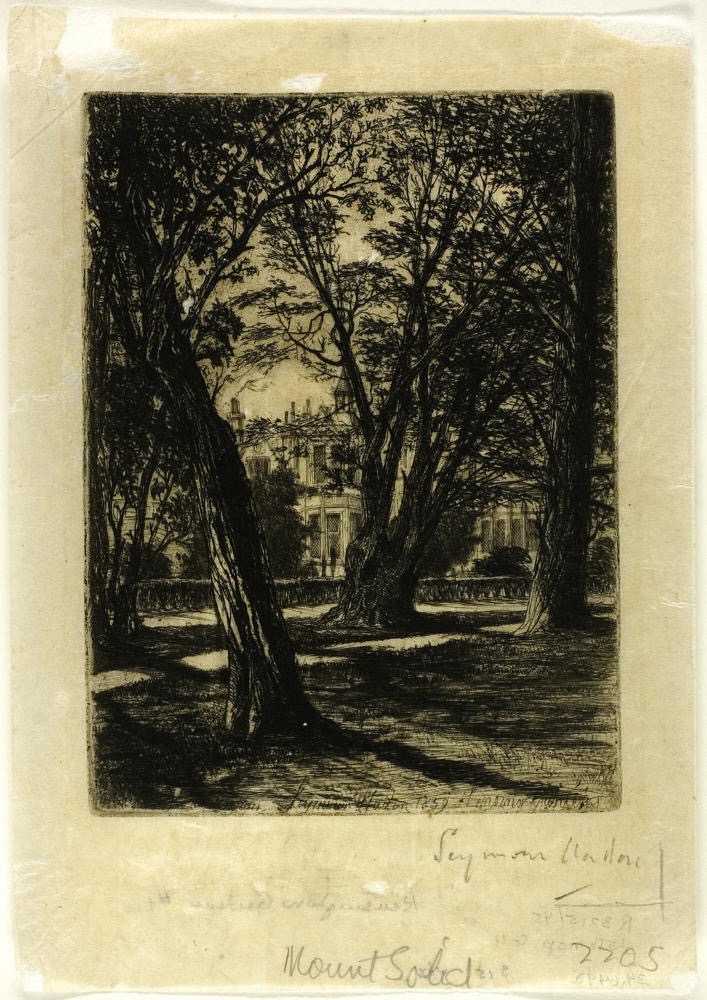
Francis Seymour Haden: Kensington Gardens, No. I (small plate) (1859)
" … bound as well as determined to drag itself through Hell again."
As our world continues to draw itself ever closer to Hell, I am gaining a renewed appreciation for SmallExtraordinaries. These tend to be tiny and easily overlooked. In most circumstances, I overlook these and never even notice my omission. In ordinary times, these go unappreciated because the foreground tends to consume the bulk of attention. When, as now, I find myself suddenly living in truly interesting times, I tend to need to avert my eyes. I understand the inexorable momentum of every slow-moving train crashing. I've seen that movie too many times and require no reinforcement to better recall the resulting calamity. I tend to become a little obsessive, as if obsessive ever comes in little sizes. I can become consumed with the resonance of demons and devils when civilization seems determined to run itself through Hell again.
I require respite now, and I have been finding it in SmallExtraordinaries.
EncroachingIrrelevance
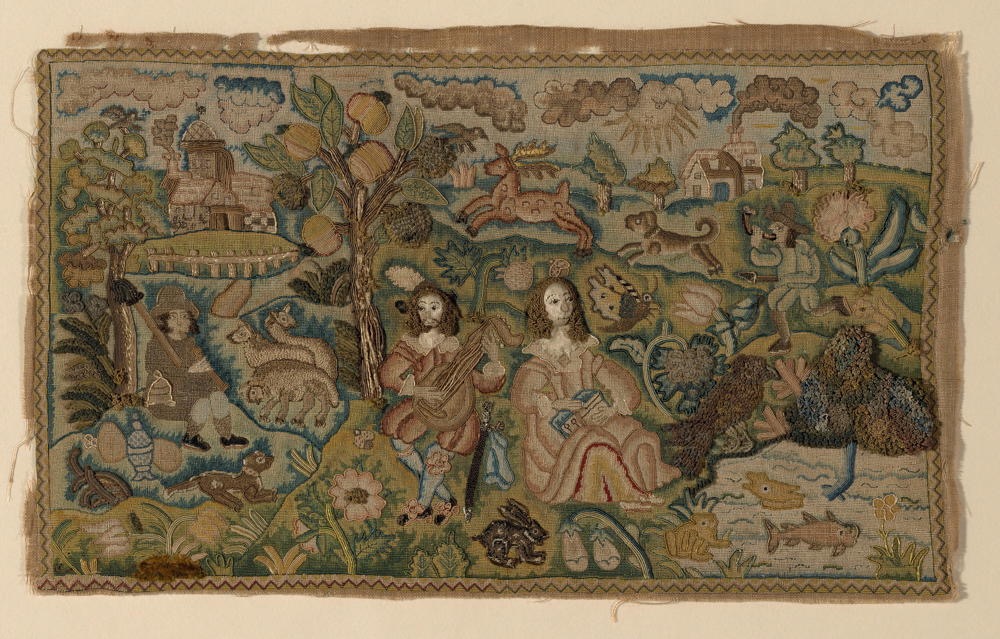
Unknown Artist: Picture (17th century)
"Such always was the way with this world."
Purpose often appears quite independent of anyone's intention. It might show after considerable effort. Whether that effort seems a success or a failure might not matter, for every system discloses its purpose through its product. The meaning of the effort appears in whatever that effort produced, however it might be judged. Many naive notions crumble beneath humbling realizations. Nobody's life turns out to be a smooth upward progression where one inevitably learns better to yield ever-increasing rewards. No, we each experience setbacks and thrusts forward, some of which, seemingly inevitably, sum to something different than we thought we had invested. Any serious search for anything occasionally results in producing its opposite; even the Ancient Greeks understood this.
Not one of us could possibly be exempted from this calculus.
BillionHerecy
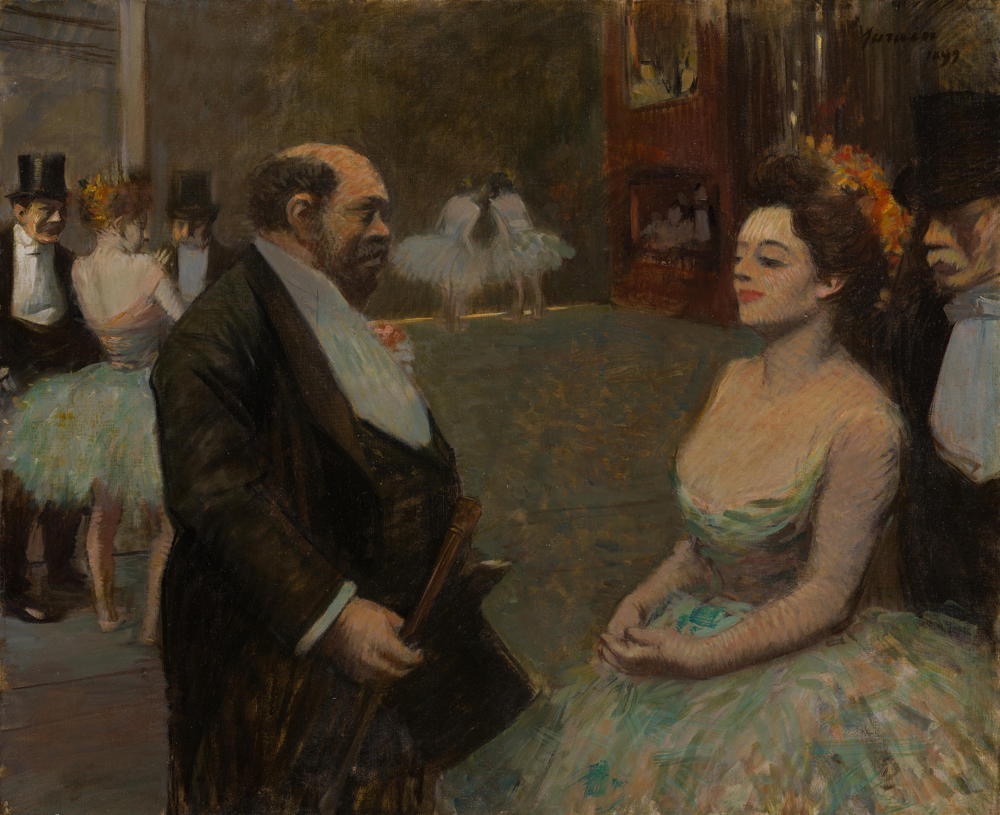
Jean Louis Forain: In the Wings (1899)
ABOUT THIS ARTWORK
In this backstage view of a Parisian opera house, ballerinas field advances from elegantly dressed male patrons, who approach them in pairs. The stoic dancer in the foreground, chin up and eyes downcast, absorbs the penetrating gaze of one large man while another looms just behind her, so close that his black top hat overlaps with her orange headdress. In 19th-century Paris, male abonnés (season ticket holders) had special access to a back room where they could socialize while watching the ballerinas warm up. Many took advantage of this privilege to sexually exploit the young dancers, who were well aware that their careers depended upon the good favor of this donor class.
——
"If you're so smart, why aren't you rich?"
Question sparked by common misconception
Our culture holds at least ten thousand curious convictions. Prominent among these are the ones insisting that wealth, and especially great wealth, imparts a wide variety of superpowers. Most notable among these must be the insistence that the wealthy are probably the smartest bears in every room, when direct evidence of this seems sorely absent. An inverse insistence might gain greater credence if anybody had the gumption to proclaim it. There does, in practice, appear to be a reverse correlation between great wealth and great wisdom, intelligence, and even kindness. I can inadvertently wound only those closest to me, but the Terribly Wealthy can crush many by simply thoughtlessly turning around, for their range of influence spreads much more widely than mine. I can choose not to go out for coffee, with nobody the worse for it, but let a billionaire opt out of their regular purchase, and it could be the death of a business. The very, very wealthy seem preternaturally responsible for many, and so seem required to practice a mandatory Noblesse Oblige.
Unfortunately, not every Terribly Wealthy person received the memo insisting upon this responsibility.
LifelongLearning
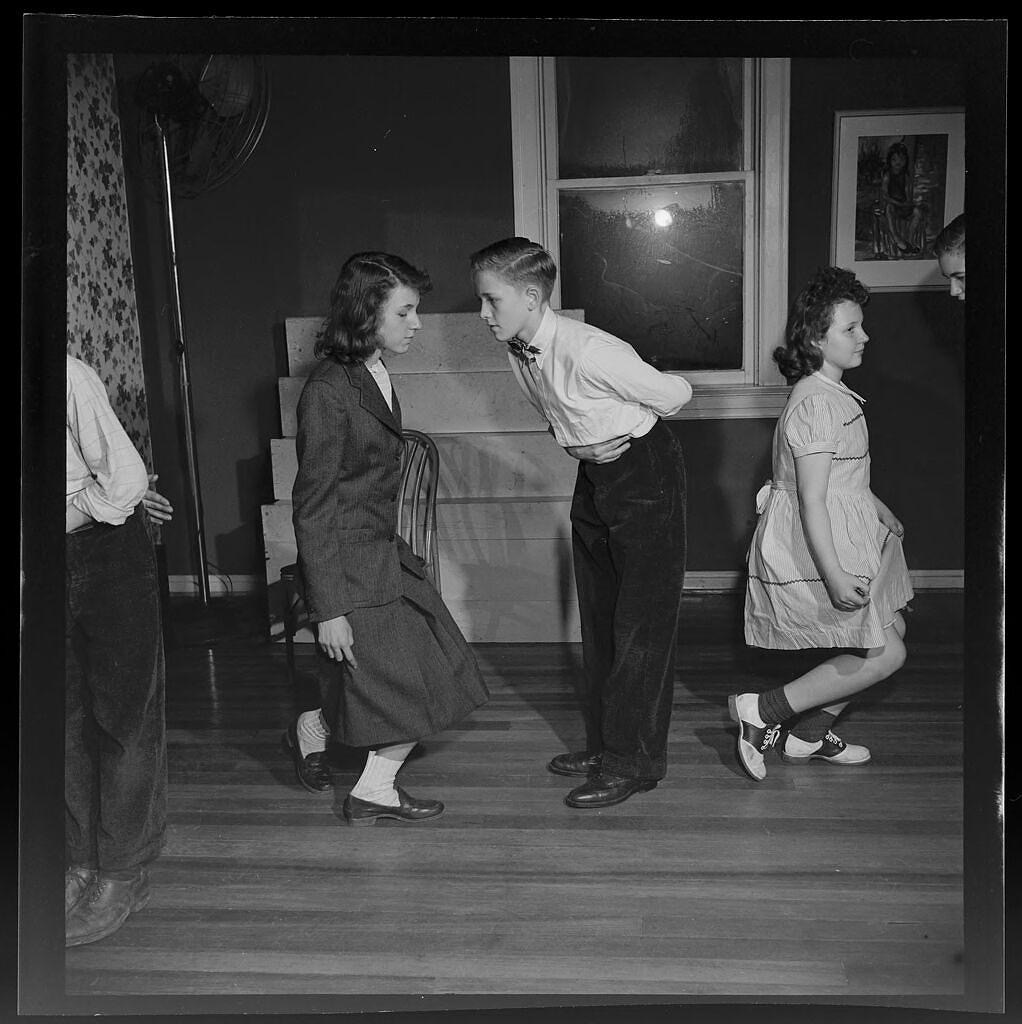
Jack Gould: Untitled
(boys and girls learning ballroom dancing) (c. 1950)
" … Lifelong Rediscovery of what I'd apparently already learned before."
I understand that I am expected to be a LifelongLearner, even though I was always a hesitant one. From my earliest days, I recall fearing the acquisition of additional information, as if it might harm me, and I can see how this innate sense might have been evolutionarily advantageous. I don't so much despise knowing; it's the acquisition that I question, for it seems like I have one of those tile puzzles in my head, and I must fiddle with it to make space for any incoming information that anybody might expect me to retain. It’s not the exposure to new concepts that I question, but the absorption of them. I have always felt like a saturated sponge.
The start of a semester in school was always terrifying, for the expectation usually seemed to be that I should already know the inevitably new material I was going to be exposed to.
Pop-Up

Attributed to Richard Parkes Bonington: Small Figures and Tent (1823)
" … while the rest of the world gets distracted going to Hell."
While The World was distracted going to Hell, I volunteered to refinish the vintage trim boards I'd saved when removing the front porch ceiling. I had the necessary equipment and experience to successfully complete the job, but I needed a paint shop. Some of the boards ran longer than my garage. I needed covered space so I could work through sun and rain. The sun this time of year could render shade essential. Rain was also always possible, and rain and paint do not mix. The answer was some sort of tent, a Pop-Up Paint Shop. The Muse bought a fancy Pop-Up canopy when she was running for Port Commissioner, to use at the 4th of July gathering in the park. It had been in its case in the basement since, except when she'd loaned it out to another candidate for the same purpose the following summer. She promised that I could use her fancy canopy, but I wanted something less precious.
Our first Pop-Up canopy, bought to use as a paint shop in the driveway, was ultimately laid low by a rainstorm.


